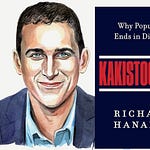On this episode of Unsupervised Learning Razib talks to Zack Stentz, a screenwriter and producer in Hollywood, and a former journalist. His credits include 2011 films X-Men: First Class and Thor, as well as the television shows Andromeda, Terminator: The Sarah Connor Chronicles and Jurassic World Camp Cretaceous.
Considering that working in Hollywood as a writer is a “dream job” for many, Razib and Stentz discuss how to break in and succeed in show business. Like most people, Stentz wrote in his spare time while pursuing a career as a journalist for many years. His trajectory shifted when he was added to an early-aughts science fiction series, Andromeda (Razib was among its fans). As in many fields, one success can open doors as you become a known quantity and Stentz also developed a partnership with another writer, Ashley E Miller, for over a decade.
Unlike what would have been true if Stentz had begun his career a few decades earlier, the 21st-century has seen massive changes in film and television. Early in Stentz’s career, there were still prominent independent films that both made a great deal of money and had a cultural impact, like 2003’s Lost in Translation or 2004’s Eternal Sunshine of the Spotless Mind. Today the film landscape is dominated by a few tentpoles inspired by comic-book movies. Stentz argues that the future of more creative work is probably going to be streaming platforms, with the big screen dominated by the PG-13 “shared universe” series. He also admits that there have been massive changes in the public’s attention span, with a fracturing of the entertainment landscape between clips, series, films and video games. Though there are still opportunities, the changes over the last twenty years have been massive. On the business end, Stentz argues that eventually, movie theaters will also have to be more aggressive about flexible pricing.
Then Razib asks Stentz about his opinions on the new Amazon series based on J. R. R. Tolkien’s work that will debut in the fall, The Rings of Power. Stentz looks back to an interview with Peter Jackson from his journalist days in the late 1990’s, and the reverence that he brought to that assignment, and worries that Jeff Bezos and Amazon do not understand they cannot just buy creative excellence. Apparently, Bezos pushed for the purchase of the rights from the Tolkien estate after seeing the success of Game of Thrones, and that prompts Razib to recount his internet interactions with the author of the novels, George R. R. Martin, in the late 1990’s. Stentz notes that Martin left a career as a television writer to write novels because he wanted more freedom, so it was somewhat ironic that he became involved in television again fifteen years after he left due to the popularity of his novels.
Finally, Stentz addresses the cultural changes in media, Hollywood and the new focus on representation. Stentz takes a moderate stance on the changes, neither promoting them with full force nor resisting inevitable change. He argues that people have to focus on building their own brand and uniqueness, as providing genuine value is the best job protection.












